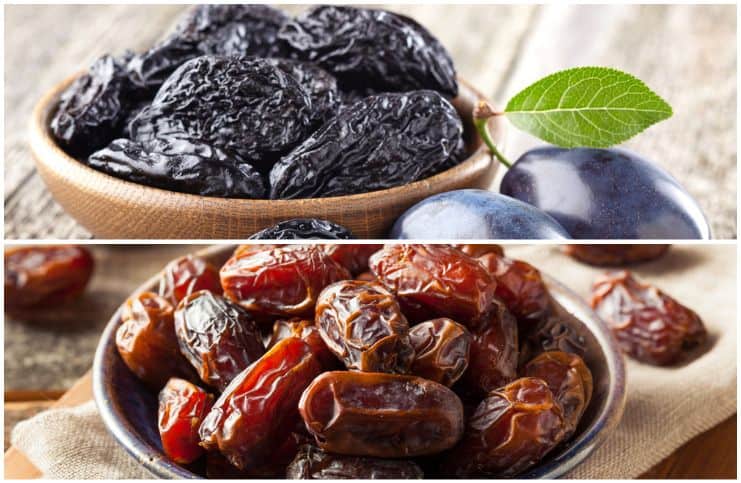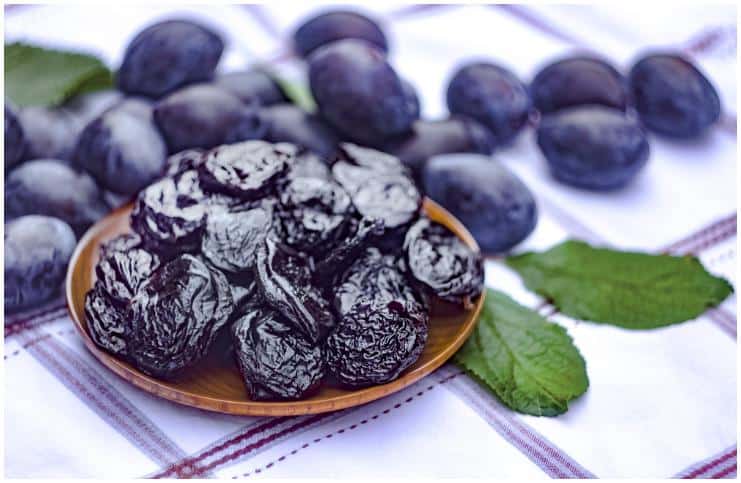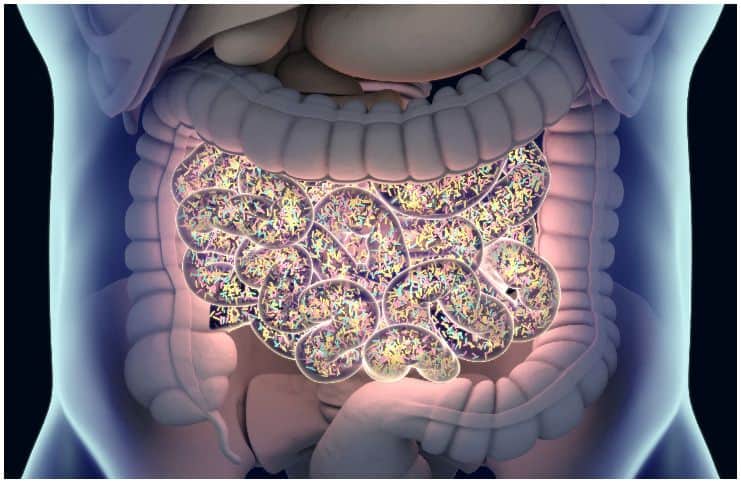Prunes vs Dates – detailed comparison:
Prunes
These fruits belong to the plum family, and they are usually sold in the form of dried fruits.
They can be eaten dried as-is, however, these fruits are occasionally processed into prune juice or are stewed to make a dessert.
Nutrition Facts
They are an excellent source of essential nutrients, including:
- vitamin A (in the form of carotenoids);
- vitamin K;
- niacin;
- thiamin;
- pantothenic acid;
- calcium;
- iron;
- riboflavin;
- boron;
- potassium;
- selenium;
- phosphorus;
- manganese;
- zinc;
- copper;
- protein;
- magnesium;
- dietary fiber.
Health Benefits
 Atherosclerosis Prevention
Atherosclerosis Prevention
Atherosclerosis (or hardening of the arteries) is a serious condition where the arteries become hardened or narrowed due to a build-up of plaque (usually made of fat, calcium, cellular waste, cholesterol, and fibrin) around the artery wall.
Atherosclerotic cardiovascular disease is the main cause of mortality in the world.
Many studies concluded that regular consumption of these fruits may help slow the development of this condition.
Good For Diabetics

A large proportion of diabetes cases can be prevented by regular physical exercise, healthy diet (low in saturated- and trans-fat), avoiding tobacco use, and maintaining a healthy body weight.
The fiber content in these fantastic fruits increases insulin sensitivity, hence, it’s useful for treating type 2 diabetes mellitus.
Weight Loss
Dried plums contain lots of dietary fiber, that is slow to digest. Slower digestion actually means that your appetite stays satisfied for longer.
In addition, foods high in fiber promotes overall fat loss by reducing appetite.
Colon Cancer
It is the 3rd most frequent form of cancer in the US. It occurs when tumorous growths develop in the colon.
Symptoms of colorectal cancer may include:
- vomiting;
- diarrhea;
- weight loss;
- constipation;
- anemia;
- a stool that looks narrower than usual;
- enlarged liver;
- jaundice;
- dark red blood in the stool;
- pain in the abdomen;
- bleeding from the rectum;
- a buildup of fluid in the abdomen;
- weakness;
- swollen lymph nodes;
- discomfort in the rectum;
- feeling bloated.
Most colorectal cancers are caused by lifestyle factors (a diet low in fiber and sedentarism), with only a small percent of cases due to genetic factors.
Intaking these dried fruits daily for 30 days completely stopped the growth of cancer and induced cell death in those cells, according to a study issued in the Journal of Nutritional Science and Vitaminology.
Eye Health
These are a very good source of vitamin A (in the form of carotenoids), a vitamin that is important for healthy vision.
Carotenoids are a group of nutrients that are usually found in red or orange fruits and vegetable (as well as dark leafy greens) and include zeaxanthin, lutein, and beta-carotene.
Side Effects
There are no scientifically proven side effects regarding the consumption of these dried fruits.
However, the presence of sorbitol makes them a natural laxative agent, which can lead to the occurrence of diarrhea.
Dates
In fact, there is archeological evidence that shows the cultivation of the fruit as far back as the days of Mesopotamia.
Nutrition Facts
These dried fruits are an important source of:
- iron;
- calcium;
- dietary fiber;
- natural sugars;
- vitamin A;
- vitamin K;
- folate;
- niacin;
- riboflavin;
- thiamin;
- magnesium;
- zinc;
- sodium;
- potassium;
- selenium;
- phosphorus.
Health Benefits
Stroke
It happens due to problems with the blood supply to the brain: either a blood vessel within the brain ruptures or the blood supply is blocked, causing brain tissue to die.
Individuals at high risk for stroke include people who have high LDL and total cholesterol, hypertension, type 2 diabetes mellitus, and people who smoke tobacco.
According to recent research, these fruits may lower the risk of stroke due to high magnesium, potassium, and fiber content.
READ MORE: Amaranth vs Quinoa
Osteoporosis
It is a bone disease that occurs when the human body makes too little bone or loses too much bone.
Key risk factors for this bone condition include lack of physical exercise, a diet high in animal protein, genetics, excessive alcohol consumption, and cigarette smoking.
Minerals like – manganese, selenium, magnesium, boron, and copper found in these fruits considerably contribute to healthy bone development, especially with the progression of age when bones gradually weaken.
Alzheimer’s Disease
It is a slowly progressive disease of the brain which is described by symptoms including – impairment of memory and disturbances in planning, reasoning, perception, and language.
Regular consumption of these fruits has been strongly associated with a lowered risk of neurodegenerative conditions and better cognitive performances in seniors.
READ MORE: Pepperoncini vs Banana Pepper
Good Source Of Vitamin B6
Vitamin B6, also referred to as pyridoxine, is a water-soluble vitamin that is part of the B-complex vitamins.
Some studies concluded that sufficient pyridoxine levels are linked with improved brain performance as well as it may be able to prevent kidney stones.
It also helps keep the immune system strong.
Moreover, vitamin B6 may reduce the risk of some types of cancer because it lessens inflammation in the body.
Side Effects
There are no scientifically proven side effects.
READ MORE: Thyme vs Oregano
Prunes vs Dates – Which Have A Better Nutritional Profile?
Both these dried fruits are nutritious and healthy and should be included in your regular diet, but prunes have a better nutritional profile due to their higher content of vitamin B2, vitamin B3, vitamin A (in the form of carotenoids), vitamin K, and copper.
In conclusion, if you’re looking for a nutritious snack that will help keep you regular, go with prunes. If you need a quick pick-me-up or want to add some sweetness to your diet, reach for dates.
READ THIS NEXT: Rosemary vs Thyme






Very informative
Thank you
just perfect